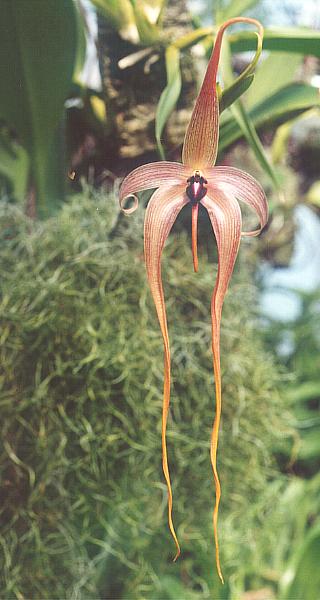
Bulbophyllum is a genus of mostly epiphytic and lithophytic orchids in the family Orchidaceae. It is the largest genus in the orchid family and one of the largest genera of flowering plants with more than 2,000 species, exceeded in number only by Astragalus. These orchids are found in diverse habitats throughout most of the warmer parts of the world including Africa, southern Asia, Latin America, the West Indies, and various islands in the Indian and Pacific Oceans. Orchids in this genus have thread-like or fibrous roots that creep over the surface of trees or rocks or hang from branches. The stem is divided into a rhizome and a pseudobulb, a feature that distinguished this genus from Dendrobium. There is usually only a single leaf at the top of the pseudobulb and from one to many flowers are arranged along an unbranched flowering stem that arises from the base of the pseudobulb. Several attempts have been made to separate Bulbophyllum into smaller genera, but most have not been accepted by the World Checklist of Selected Plant Families.

Bulbophyllum biflorum is a species of orchid. This species was found in Java, Sumatra, Bali, Borneo, the Philippines, and the Thai and Malaysian peninsula. The flower size is 7.5 cm long.
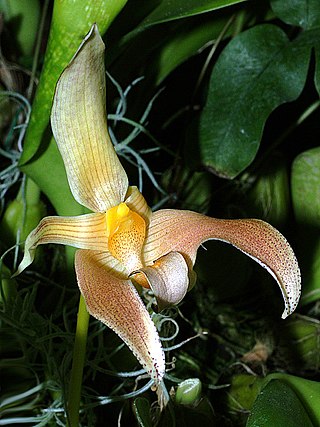
Bulbophyllum lobbii is a species of orchid, also known as Thailand bulbophyllum or Sumatran bulbophyllum. It was named for the plant hunter Thomas Lobb, who introduced it to England from Java in 1846.

Bulbophyllum amplebracteatum is a species of orchid in the genus Bulbophyllum.

Bulbophyllum ankylochele is a species of orchid in the genus Bulbophyllum. This orchid species is native to the New Guinea and is known for its small size and beautiful, intricate flowers. The scientific name "ankylochele" comes from the Greek words "ankylos," meaning "bent," and "cheilos," meaning "lip," referring to the lip of the flower that is bent downwards.

Bulbophyllum antenniferum is a species of orchid in the genus Bulbophyllum.

Bulbophyllum apodum is a species of orchid in the genus Bulbophyllum. It bears a 12–14 cm inflorescence with around 40 small fragrant white flowers on it. It is native to Sikkim, Borneo, China, Malaysia, Thailand, the Philippines, Vanuatu, and Vietnam.
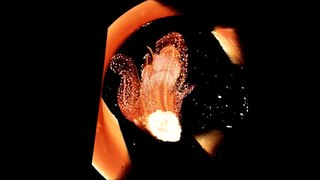
Bulbophyllum bicoloratum is a species of orchid in the genus Bulbophyllum.
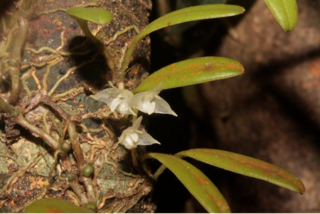
Bulbophyllum curranii is a species of orchid in the genus Bulbophyllum.
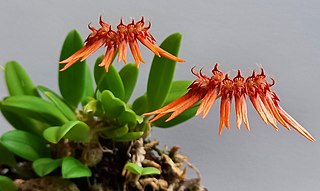
Bulbophyllum hirundinis is a species of orchid in the genus Bulbophyllum.

Bulbophyllum lizae is a species of orchid in the genus Bulbophyllum.
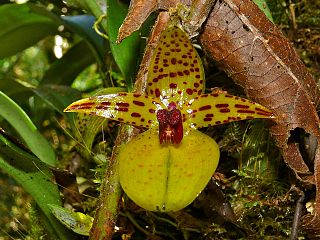
Bulbophyllum membranifolium is a species of orchid in the genus Bulbophyllum.

Bulbophyllum obovatifolium is a species of orchid in the genus Bulbophyllum.

Bulbophyllum ovalifolium is a species of orchid in the genus Bulbophyllum.

Bulbophyllum retusiusculum is a species of orchid in the genus Bulbophyllum.

Bulbophyllum scaberulum is a species of orchid in the genus Bulbophyllum.
Bulbophyllum zebrinum is a species of orchid in the genus Bulbophyllum. It can be found in Indonesia.

Dendrobieae is a tribe in the subfamily Epidendroideae, in the family Orchidaceae. The Dendrobieae are mostly tropical, epiphytic orchids which contain pseudobulbs.
An attractant is any chemical that attracts an organism, e.g. i) synthetic lures; ii) aggregation and sex pheromones ; and iii) synomone

Bulbophyllum drymoda is a species of orchid in the genus Bulbophyllum. It was formerly the type species of the genus Drymoda, now synonymous with Bulbophyllum. It is native to Myanmar, Thailand, and Vietnam.


















